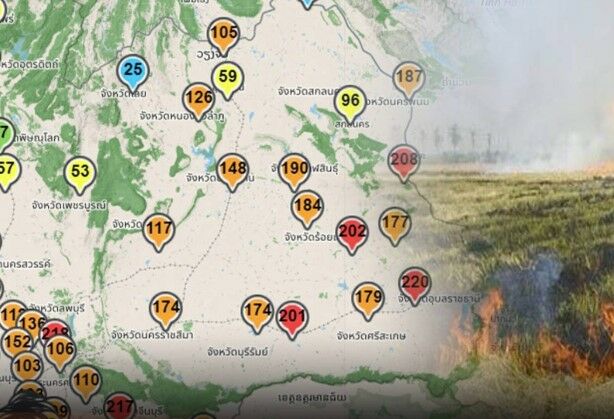Thai PM Srettha and Cambodian PM engage in talks over air pollution crisis

Prime Minister Srettha Thavisin declared his intention to engage in a crucial dialogue with Cambodian leader Hun Manet to tackle the alarming surge of transboundary air pollution.
PM Srettha, expressing concern, revealed that a look at the satellite map shows that most of the relevant hotspots are in Cambodia, and the wind is blowing from the east.
The MODIS satellite, a watchful eye in the sky, initially detected a staggering 644 hotspots in Cambodia on Tuesday, but that number has now dramatically dwindled to 171.
As a dark haze envelops the region, the Centre for Air Pollution Mitigation issued an urgent report today. PM2.5 dust, surpassing the critical 37.5 µg/m³ threshold, has gripped 30 provinces, including the capital city, Bangkok. The affected provinces span a wide range, from Nakhon Sawan to Surin.
Bangkok, in particular, is grappling with 12 areas registering excessive PM2.5 levels. Thananchai Wannasuk, Chief of the 11th Office of the Environment and Pollution Control department, pointed a stern finger at the burning of farm waste, identifying it as the major catalyst for the hotspots and the surge in PM2.5 levels in northeastern provinces like Nakhon Ratchasima, Chaiyaphum, Buriram, and Surin, reported Thai PBS World.
Despite a fervent campaign urging farmers to refrain from burning waste, Thananchai lamented that many have chosen to turn a deaf ear to the plea. As the pollution crisis escalates, the two prime ministers’ impending conversation takes on heightened significance in the race to salvage Southeast Asia’s air quality.
In related news, a team of scientists from Mahidol University’s Faculty of Science, focusing on osteoporosis, recently discovered a potential link between fine particulate matter smaller than 2.5 microns (PM2.5) and the onset of osteoporosis. They observed that lab rats exposed to PM2.5 developed bone inflammation, leading to an increase in bone-degrading cells called osteoclasts.
The research, carried out by the Centre of Calcium and Bone Research (COCAB), suggests that PM2.5 particles when inhaled, infiltrate the lungs and other organs.
Latest Thailand News
Follow The Thaiger on Google News:


























